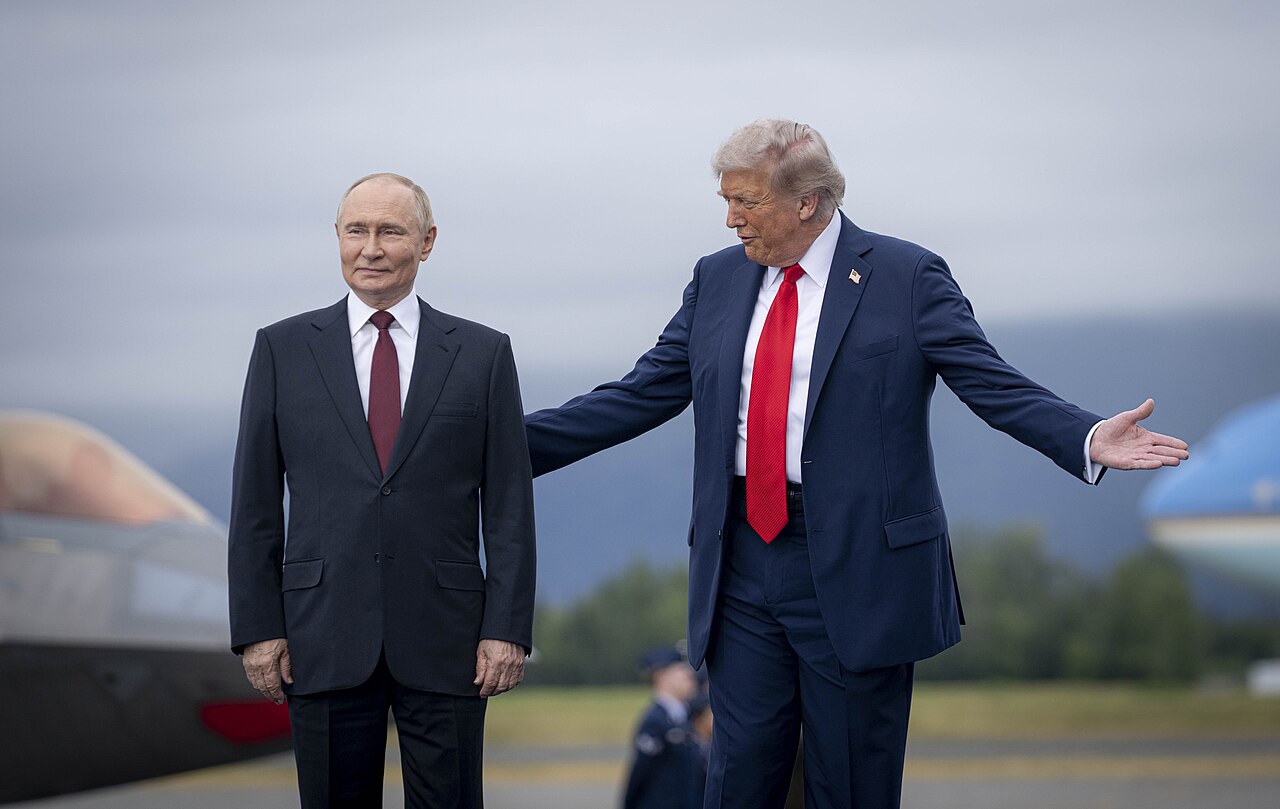
The news from Alaska caused shockwaves in every capital city of Europe. I refer, of course, not to ordinary citizens, but to that special elite of wise men and women who like to call themselves our leaders.
The level of propaganda that is being spewed by the media is surpassing anything I have ever witnessed – or hope to witness.
The chorus of condemnation has reached deafening levels. The level of hysteria that this one event has caused clearly reflects the extraordinary degree of frustration on the part of the self-appointed ‘leaders of the free world’, who are indulging in the kind of violent tantrum of a spoilt child who has just been deprived of a favourite toy.
Just one week before, the same leaders were all congratulating themselves with the thought that they had convinced the President of the United States to launch a devastating new wave of sanctions aimed at the total destruction of the Russian economy and the complete undermining of Vladimir Putin’s war in Ukraine.
The New York Times reported in exasperated tones:
“The cease-fire that Mr. Trump gave up in Alaska had been so important to him last month that he threatened tough new economic sanctions if Russia did not pause the war within 50 days. Then he moved the deadline up to last Friday. Now there is no cease-fire, no deadline and no sanctions plan.”
Suddenly, as if by a cruel and unexpected twist of fate, all their dreams were shattered. In the space of 24 hours, everything is turned into its opposite.
This would be a most valuable lesson in the superiority of the method of dialectical materialism, except that the thick skulls of our bone-headed political leaders are quite impervious to lessons of any sort.
In place of arguments, they resort to new levels of bluff and bluster, ranting and raving against the evil machinations of the man in the Kremlin, and the astonishing ‘naïveté’ (read: stupidity) of the man in the White House.
What is the unforgivable error that the President of the United States is supposed to have committed? He has actually agreed to sit down and talk to the leader of the Russian Federation – the man who, as we have been repeatedly told, ‘launched a brutal and unprovoked war of aggression against Ukraine’ in 2022, and is guilty of every crime known to humankind, with the possible exception of devouring babies for breakfast (that one they have so far refrained from resorting to – but everything comes to him who waits…).
Here we reproduce just a couple of choice examples. The New York Times immediately published an article entitled ‘Trump bows to Putin’s approach on Ukraine’.
In it, we read the following:
“On the flight to Alaska, President Trump declared that if he did not secure a cease-fire in Ukraine during talks with President Vladimir V. Putin of Russia, ‘I’m not going to be happy,’ and there would be ‘severe consequences.’
“Just hours later, he got back on Air Force One and departed Alaska without the cease-fire he deemed so critical. Yet he had imposed no consequences, and had pronounced himself so happy with how things went with Mr. Putin that he said ‘the meeting was a 10.’
“Even in the annals of Mr. Trump’s erratic presidency, the Anchorage meeting with Mr. Putin now stands out as a reversal of historic proportions. Mr. Trump abandoned the main goal he brought to his subarctic summit and, as he revealed on Saturday, would no longer even pursue an immediate cease-fire. Instead, he bowed to Mr. Putin’s preferred approach of negotiating a broader peace agreement requiring Ukraine to give up territory.
“The net effect was to give Mr. Putin a free pass to continue his war against his neighbour indefinitely without further penalty, pending time-consuming negotiations for a more sweeping deal that appears elusive at best.”
In the following hours, one newspaper article and television interview followed another to create a veritable cacophony of protest against Trump’s alleged betrayal of Ukraine. The violent tone of these attacks exceeded all previously known levels.
The former British Conservative Prime Minister, Boris Johnson, lost no time in joining in with the most colourful and elegant turns of phrase, highly appropriate for a diplomat of international standing and respect.
He called the Alaska summit meeting “just about the most vomit-inducing episode in all the tawdry history of international diplomacy.”
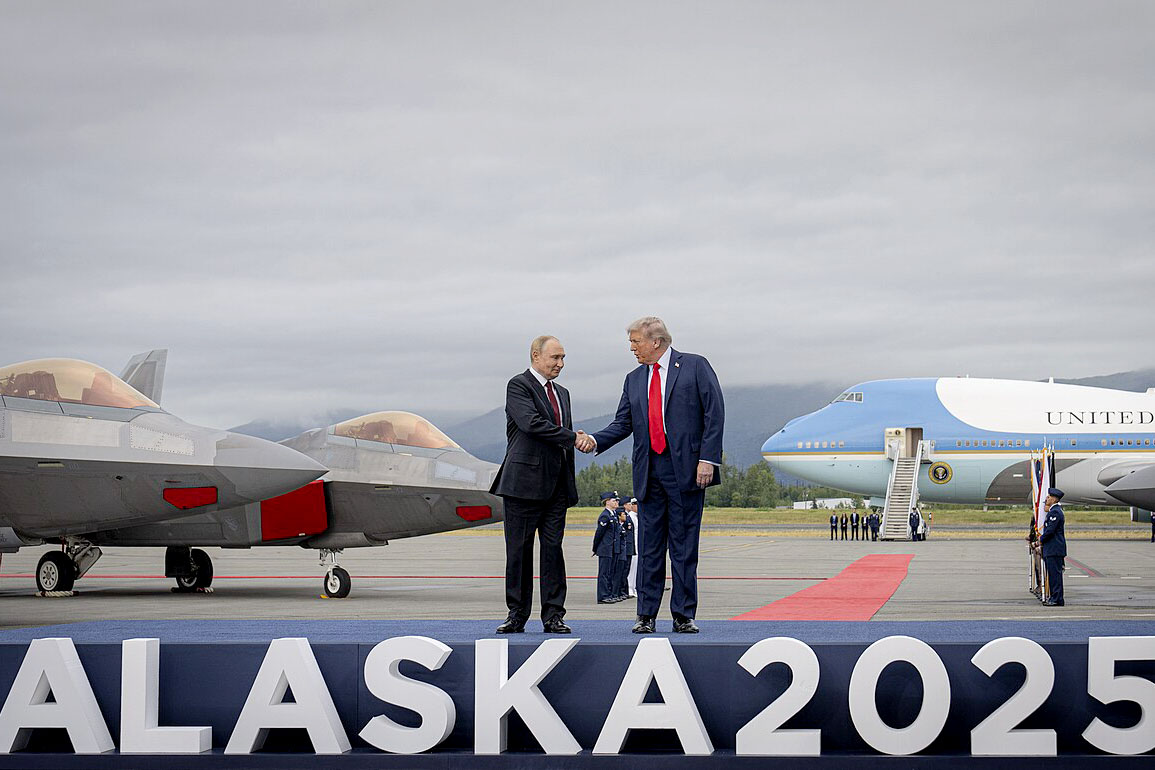
We respectfully leave to one side the possible effects on our digestive system that might possibly be derived from even the most superficial account of Mr Johnston’s long history of lies, deceit and sordid manoeuvring, and confine ourselves to more serious commentators.
“He got played again,” said Ivo Daalder, who was ambassador to NATO under President Barack Obama. “For all the promises of a cease-fire, of severe economic consequences, of being disappointed, it took two minutes on the red carpet and 10 minutes in the Beast for Putin to play Trump again. What a sad spectacle.”
The New York Times went so far as to compare Trump meeting with Putin with the appeasement of Adolf Hitler by Neville Chamberlain in 1938:
“Much like then, the president’s chummy gathering in Alaska on Friday with Mr. Putin, who is now under U.S. sanctions and faces an international arrest warrant for war crimes, has generated ferocious blowback. Some critics compared it to the 1938 conference in Munich, when Prime Minister Neville Chamberlain of Britain surrendered part of Czechoslovakia to Germany’s Adolf Hitler as part of a policy of appeasement.”
To such absurd levels of hysteria have these people sunk.
We will deal later with the oft-repeated accusation that Donald Trump was ‘played’ by the man from the Kremlin, who, we are told, has learned from his KGB past the dark arts of how to manipulate people and bend them to his will.
We shall return to this chorus of outrage later, and analyse its content and expose the hidden motives behind it. For the time being, let us return to the Alaska summit.
Trump’s aims
The declared aim of Donald J Trump in calling for this conference was to try to find a peaceful solution to the war in Ukraine.
Now, to any reasonable person, it would seem evident that in order to achieve a negotiated peace, it will be necessary to sit down and talk to both sides of the conflict. The initial aim of such a negotiation would be to clarify the positions of both sides, and then gradually, by a process of patient discussion, to try to establish some common ground which might permit a negotiated settlement.
Such a conclusion would appear to be self-evident even to a not particularly intelligent six-year-old. Yet it is something that all the leaders of the main European countries reject absolutely.
The fact that Donald Trump has dared to even sit at the same table as Vladimir Putin filled them with an apoplectic rage that leads one to fear for their blood pressure.
Rather than praise the president for his initiative in seeking to negotiate peace, they spend all their time ranting against it. The mood of panic in governing circles from London to Berlin is so extreme that it borders on an outbreak of collective hysteria.
Unfortunately for them, Donald Trump shows no sign whatsoever of being moved by it.
But let us for a moment attempt to penetrate beyond the surface hysteria and attempt to get some idea of the logic behind it.
If we analyse its content, we will come up with the following conclusions:
- Trump played into Putin’s hands by agreeing to the Russians’ urgent request for a one-to-one meeting.
This is false. All the available information clearly shows that it was the Americans that requested this meeting, not the Russians. Trump clearly sent Witkoff to Moscow for this purpose.
- The purpose of this meeting was to arrive at a deal to secure peace in Ukraine. The first step was supposed to be the ceasefire. This was not achieved. There was no deal, and no ceasefire. Therefore, the meeting was a complete failure.
This is also false. Prior to the meeting, Trump made it clear that he did not expect to reach any deal in Alaska. The purpose of the meeting was basically to re-establish contacts that had been broken for a long time, exchange views on a range of subjects, including Ukraine, and hopefully arrive at an agreement to continue future discussions.
All these aims were achieved successfully. And that is precisely what infuriates and frightens the Europeans, who, more than anything else, are afraid that America and Russia will establish close relations, and that they will be excluded from them.
This fear may be well-founded.
- This meeting was a huge propaganda victory for Vladimir Putin, who was previously isolated in the world and now occupies centre stage, together with the American president.
On 6 August, BBC News published an article with the headline: ‘Putin welcomed back on world stage with red carpet’. It said:
“When President Vladimir Putin landed back onto the world stage on Friday, the skies in Alaska were cloudy. Waiting with a red carpet spread across the tarmac of the Joint Base Elmendorf-Richardson was US President Donald Trump.
“As Putin approached, Trump clapped. The two leaders warmly shook hands and smiled.
“It was a remarkable moment for Putin – a leader shunned by most Western nations since Moscow launched its full-scale invasion of Ukraine in 2022. His international travel has since been largely limited to nations friendly to the Russian Federation, such as North Korea and Belarus.
“The fact that the Alaska summit happened at all was a victory for Putin. But this welcome would have surpassed the Kremlin’s wildest dreams. In a short six months Putin went from being a pariah in the eyes of the West to being welcomed on US soil like a partner and friend.
“To cap it off, in an apparently unscripted moment, Putin decided to accept a lift to the airbase in Trump’s armoured limousine instead of driving in his own Moscow-plated presidential state car.
“As the vehicle pulled away, the cameras zoomed in on Putin, sitting in the backseat and laughing.”
Oh dear! The two men actually met and shook hands! What a disaster! Worse still, they both drove off in the president’s car, and moreover, were actually seen to be laughing!
For the leaders of the western world, the Apocalypse has arrived. The two leaders of the most powerful countries in the world had actually met and, by all appearances, seem to have excellent relations.
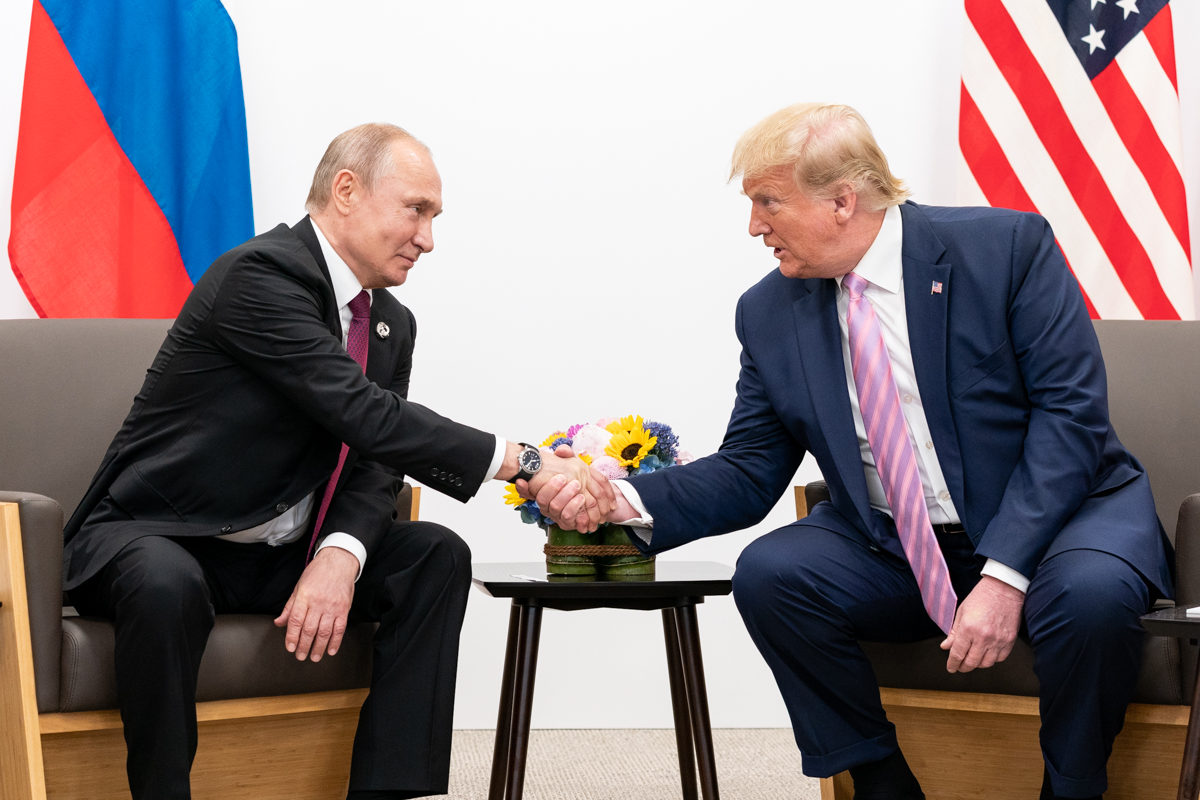
This was not at all in the script! It proved what the Europeans had been saying all along. This meeting was a thoroughly bad idea and should never have taken place! In fact, no western leader must have any contact with the Russians whatsoever.
It is quite true that Vladimir Putin scored a considerable propaganda victory. But the assertion that he was somehow “isolated internationally” is entirely untrue. In fact, Russia now has far more allies in the world than it had before the Ukraine war. The fact that Russia is boycotted by a handful of imperialist states in Europe and North America is another matter altogether. But it remains to be seen how long this insane situation will be allowed to last.
Nor is it true that Trump has gained nothing by holding the summit. Quite the opposite is the case. In fact, he is gaining far more than Putin.
By calling this meeting (we insist that it was Trump, not Putin, who called for it), he successfully managed to extricate himself from the appalling mess in which he had landed himself, as a result of following the disastrous advice given to him by the Europeans and Lindsey Graham and his warmongering allies in Washington.
By constantly pressing the demand for more sanctions against Russia, they pushed Trump into making a threat which, had it been carried out, would have been a disaster for his attempts to reach a negotiated settlement with Russia.
This, in fact, was the real intention of the Europeans all along. But when Trump realised that the introduction of sanctions would inevitably fail to force Russia to accept western demands, and would have disastrous effects both for the United States and for his own position, he decided to take a dramatic step in order to stop it.
This was, in fact, a very deft move, which, at a stroke, allowed Trump to park the promised sanctions for the foreseeable future, to disarm his warmongering critics in the Senate and to put the Europeans and Ukrainians in an impossible position. All of this, he succeeded in achieving. It was, therefore, not a failure at all, but a very striking success.
- Donald Trump is ‘naïve’ (read stupid) and easily manipulated by Putin, who, as a former KGB agent, is skilled in the black arts of manipulation, and appears to have some kind of mysterious hold over the American president.
The precise nature of this alleged ‘mysterious hold’ has never been made clear, although it is continually being hinted at in innumerable articles and television programmes.
Suffice it to say that this kind of explanation explains precisely nothing. Nobody has ever informed us as to how this mysterious power came about, or, indeed, what precisely it consists of.
Might it not just be possible that Donald Trump was convinced by the arguments that were put to him by the Russian leader? The assumption is that no such convincing arguments exist, and therefore some other peculiar explanation must be found.
As a matter of fact, as we shall show, Putin had some very convincing arguments indeed, and these arguments, based on empirically verifiable facts, would convince any person that was not hopelessly prejudiced, with a mind made up in advance.
This is precisely what the meaning of negotiations is. Unfortunately, for the leaders of the ‘free world’, that kind of negotiation is not acceptable.
They had worked out in advance a series of demands, which they knew would never be acceptable to the Russians, and fully expected that Trump would go to the meeting in order to push those demands in the form of an ultimatum, which would guarantee the failure of the negotiations and a continuation of the war.
How it is possible to end the Ukraine war – which is, in fact, a proxy war between Russia and America – without discussions between both sides in the war is a mystery. In fact, it is not possible at all.
And the real policy of the Europeans – and also of Volodymir Zelensky – is to prevent any contact between the Americans and Russians and to sabotage any attempt whatsoever at negotiating a peace deal between them.
Once we have understood this, we have understood everything that we need to understand about the state of the war and the cynical diplomatic manoeuvres that, while claiming to stand for ‘a just and lasting peace’, in reality aim to prolong the war for an indefinite period.
Once again, ‘Russiagate’
The spectre of ‘Russiagate’ arises from the dead. In 2016, US intelligence agencies accused Russia of interfering in the American electoral process. This was the origin of the ‘Russiagate’ scandal.
A noisy campaign was launched in the media, clearly part of an attempt to deprive Trump of the presidency. The claims were long ago shown to be false.
Trump has repeatedly denied suspicions of any improper contacts with Russian officials. Moscow also called the allegations about its attempts to influence the course of the US elections groundless.
Robert Mueller, serving as special prosecutor, conducted an inquiry into the suspected efforts to sway the election. The Justice Department issued his concluding report in 2019, stating that the investigation did not uncover evidence of collusion between Russia and Donald Trump.
Yet The New York Times published the following:
“Mr. Trump has long expressed his admiration for Mr Putin and sympathy for his positions. At their most memorable meeting, held in Helsinki in 2018, Mr. Trump famously accepted Mr Putin’s denial that Russia had intervened in the 2016 election, taking the former K.G.B. officer’s word over the conclusions of American intelligence agencies.”
This statement fails to answer the obvious question: who was telling the truth? Vladimir Putin or America’s intelligence agencies?
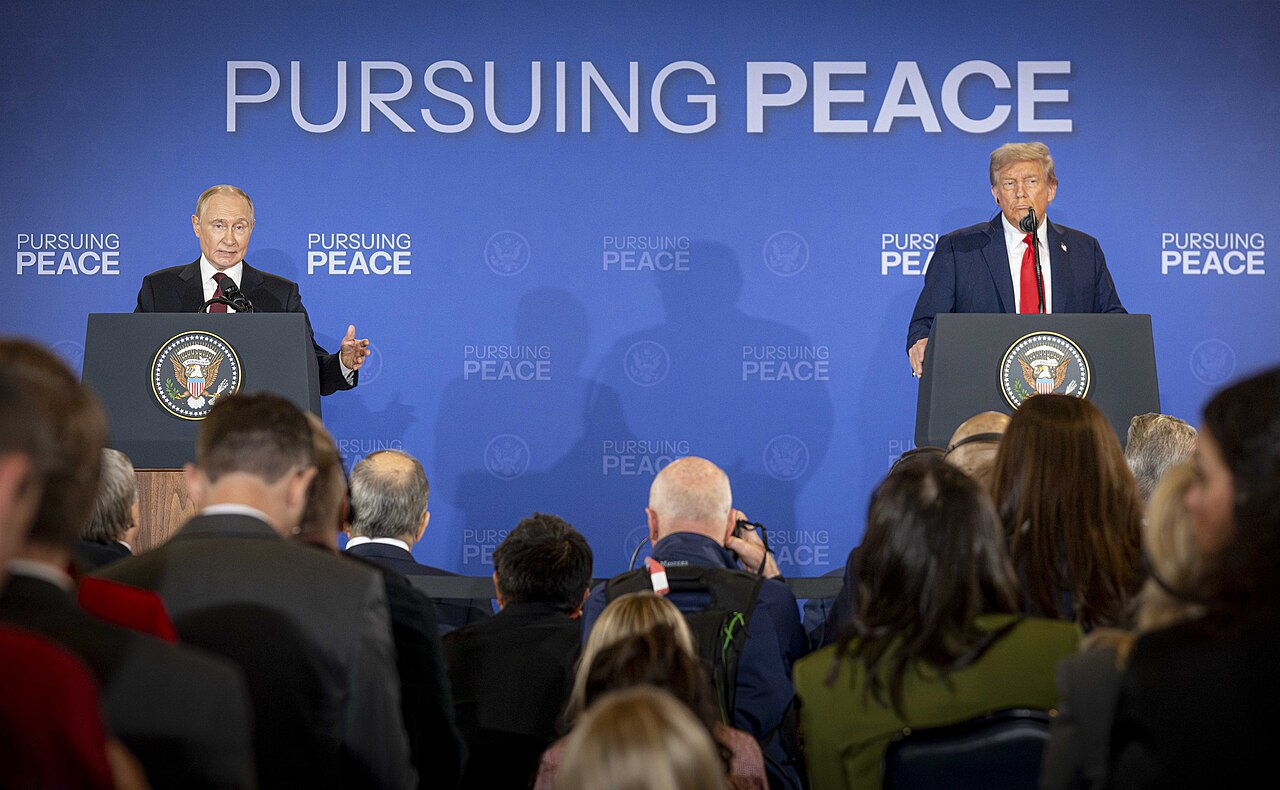
Months before the election, the US intelligence community had unanimously assessed that Russia had neither intention nor capability to meddle in the voting process.
But in December 2016, soon after Trump’s victory, the Obama administration ordered another report overturning the previous assessment.
The key intelligence that Russia had not influenced the outcome of the election was withheld and classified.
Recently, Tulsi Gabbard, the new Director of National Intelligence (DNI), announced the declassification of ‘Top Secret’ emails from 2016 that she said show former DNI leader James Clapper trying to suppress concerns that were raised in connection to efforts to falsely tie President Donald Trump to Russia and interfere with the outcome of the 2016 presidential election.
The papers from former Intelligence Community (IC) chiefs reveal that the story that Russia meddled in the 2016 election in the United States was all a lie.
Yet supposedly serious journalists, even today, insist on repeating this lie, presenting it as the unquestionable truth. And they do so without even blushing.
As the saying goes: why let the facts spoil a good story?
America’s bluff is called
How then do we explain the conduct of Donald Trump at this meeting? That is really not a difficult question to answer.
Donald Trump entered the discussions in Alaska, not with a strong position, but, on the contrary, with a very weak one. He tried to bluff the Russians by issuing all manner of ferocious threats of bone-crushing sanctions which the western leaders convinced themselves into believing would bring Russia to its knees. But all to no avail.
Prior to the meeting, Trump had received information that showed that his threatened sanctions would have no effect. China and India – the main nations which purchase oil and gas from Russia – both flatly stated that they would not accept any attempt to interfere with their right to trade with Russia – or any other country.
The threat of sanctions therefore fell flat on its face, even before it was introduced. The significance of this was not lost on the man in the White House, who has a good head for business. He is also aware of the basic rules of the game of poker.
In the context of a poker game, if you see an opponent betting aggressively, but you suspect their hand is weak, you might decide to call their bluff. If you guessed right and they can’t show a strong hand, you win the pot.
In the world of politics and diplomacy, it is never advisable to bluff unless you are prepared to back up your bluff with actual decisive action. To imagine that you possess a stronger hand than that which you really have is to invite a humiliating defeat once your bluff is called.
And in the complicated game of poker that has been played out on the international stage for the last few months, the bluff of the Americans and Europeans has finally been called.
It reveals the real balance of forces. This was clear as much to Trump as it was to Putin. That is why Putin made absolutely no concessions of substance, and also why Trump accepted the situation as a fait accompli.
To use a poker analogy, Putin held all the cards in his hands, while Trump was left with no cards of any importance to play. No additional explanations of mysterious powers of persuasion are required in order to explain this perfectly evident fact.
The fraud of the ceasefire
The main basis for the howls of protest was the fact that there was no agreement in Alaska for a ceasefire. This demand has been reiterated by both Zelensky and his European cronies with tedious regularity in recent months.
Before the summit, the EU’s top diplomat, Kaja Kallas, said meaningful negotiations to end the war in Ukraine could only take place “in the context of a ceasefire or reduction of hostilities”.
Now, that seems to have all changed.
After his meeting with Putin, President Trump said that a full – no doubt lengthy – peace process was the “best way” to end the war, with fighting continuing on the ground in the meantime. This, he said, was because temporary ceasefires “often times do not hold up”.
What does this mean?
On the surface, a ceasefire would appear to be a reasonable demand and a step towards peace. But it is no such thing. It is a cynical manoeuvre, designed to prolong the war, and above all, to drag the Americans into it and prevent them from withdrawing.
This demand is always linked to another demand – the demand for American “security guarantees” for Ukraine in the event of a ceasefire. What does this mean?
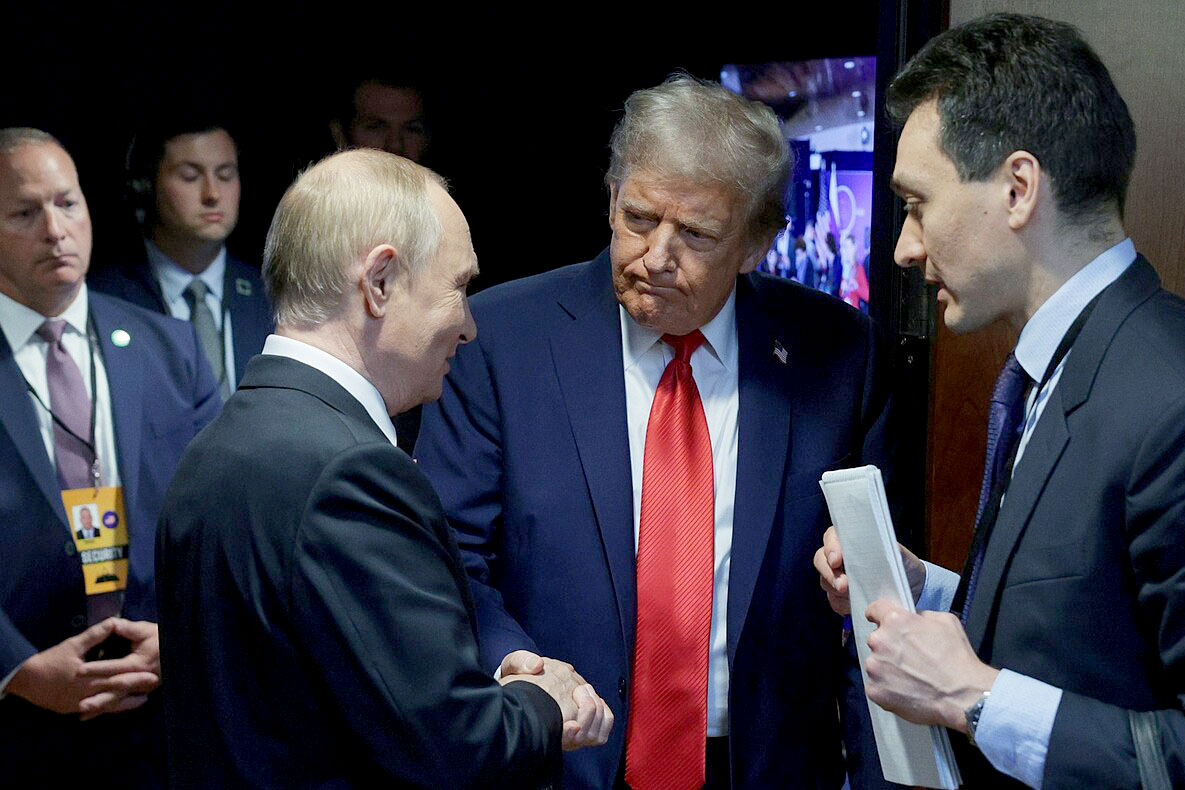
The immediate effect of a ceasefire, in the situation where Russia is clearly winning the war, and the Ukrainians are in a desperate position, would be to provide the latter with a breathing space, which could then be used by NATO to re-equip and rebuild the shattered Ukrainian forces, in preparation for a new offensive against the Russians.
Such a ceasefire can be broken at any time Ukrainians decide that it is useful for them, and they will place the blame for the breakdown at the door of the Russians.
In the meantime, the so-called ‘coalition of the willing’ will be standing by, waiting for the green light to send NATO troops into Ukraine, allegedly to ‘defend the ceasefire’, but in practice to prepare for a direct conflict with Russia.
Zelensky is insistent on this issue: “Security must be guaranteed reliably and in the long term, with the involvement of both Europe and the US,” he says.
But there is a problem with this strategy. Without active American support, it has no chance whatsoever of succeeding. If the Americans are foolish enough to give the Kyiv regime and its European cronies what they’re asking for – an American security guarantee – Ukrainians will call upon the Americans to come to their aid. In this way, the USA would be dragged into yet another unwinnable, costly and bloody ‘forever war’.
This is something that Trump wishes to avoid at all costs, as indicated by his social media post calling for peace negotiations rather than a temporary ceasefire.
His words indicate that he has understood that the Europeans and Zelensky are setting a trap for him. That is why he has avoided any mention of the ceasefire, and, despite claims to the contrary, it does not seem likely that he will abandon his previous refusal to provide any guarantee whatsoever to Ukraine.
His public abandonment of the demand for a ceasefire has therefore provoked shock and horror in the ranks of the European and Ukrainian warmongers.
Yet this does not at all mean that they will cease their noisy campaign in favour of prolonging the war indefinitely. Quite the opposite, in fact. We can expect this campaign to redouble in its intensity in the next few months.
A ‘maximalist’ demand?
Putin has explained on numerous occasions that a comprehensive peace agreement would require NATO to pull forces back to its pre-expansion 1997 borders, bar Ukraine from joining the alliance, and would require Kyiv to not only give up territory in the east but also drastically reduce the size of its armed forces.
These demands, which are routinely (and absurdly) dismissed by western commentators as ‘maximalist’, are in fact minimum requirements to guarantee Russia’s future security against any attempt by NATO to convert Ukraine into a powerful nuclear state on its border.
Let us pose the question in a different way. If Russia were to insist on the right to station nuclear weapons in military bases right on the Mexican border with the United States, one assumes that the Americans would take immediate and direct action to prevent this from happening.
Does anyone think that would be regarded as ‘maximalist’? Or would it be immediately recognised as a legitimate active defence on the part of the USA? The question answers itself.
The battlefield will decide
In the recent period, attention has been concentrated on the endless zig-zags and reverses in the field of diplomacy and negotiations. This has served to detract attention from the actual situation on the battlefield in Ukraine.
The argument that is often repeated, that this struggle has now reached a point of deadlock in which the contending forces are balanced and the frontline has hardly moved, is radically false.
The line of battle is constantly moving from east to west. The Russian army continues its remorseless advance, conquering one strong point after another, driving the Ukrainians back all along the line.
The next objective will be the important strategic city of Pokrovsk, which the Ukrainians are attempting to defend at all costs. They have dispatched many reinforcements, which, owing to the acute shortage of manpower, have had to be drawn from other sectors, which consequently become severely weakened and vulnerable to attack.
All this will not save Pokrovsk, which is now practically surrounded. A large number of Ukrainian troops are now isolated and threatened with certain defeat in the not-too-distant future.
The logical solution would be for their leaders to call for a strategic withdrawal while there is still time. But Zelensky and Ukrainian Commander-in-Chief Syrskyi appear not to understand the command to retreat, and most probably will order these unfortunate men to stand and fight to the death.
The fall of Pokrovsk is therefore inevitable in the near future. It will represent a catastrophe of the first order, preparing the way for a total collapse of Ukrainian defence in Donbass.
Now, for the first time, reports in the western press – even fervently pro-Ukrainian publications like the Daily Telegraph – are publishing articles recognising that Ukraine is losing the war.
They publish interviews with officers and soldiers reflecting a catastrophic collapse of morale, leading to mass desertions and a general reluctance of young people to join the army and fight what is clearly a lost cause.
All this is known, both to the Ukrainian leaders themselves and to their allies in London, Paris and Washington.
Since the war is going very badly for Ukraine, it would appear that the men in Kyiv, and above all, their European allies, have deluded themselves that they can reverse their defeats on the battlefield by securing a victory in the field of diplomacy.
However, it must be firmly kept in mind that in a war, diplomacy will always occupy a secondary position. It is always the force of arms, not the force of argument, that determines the outcome of the war.
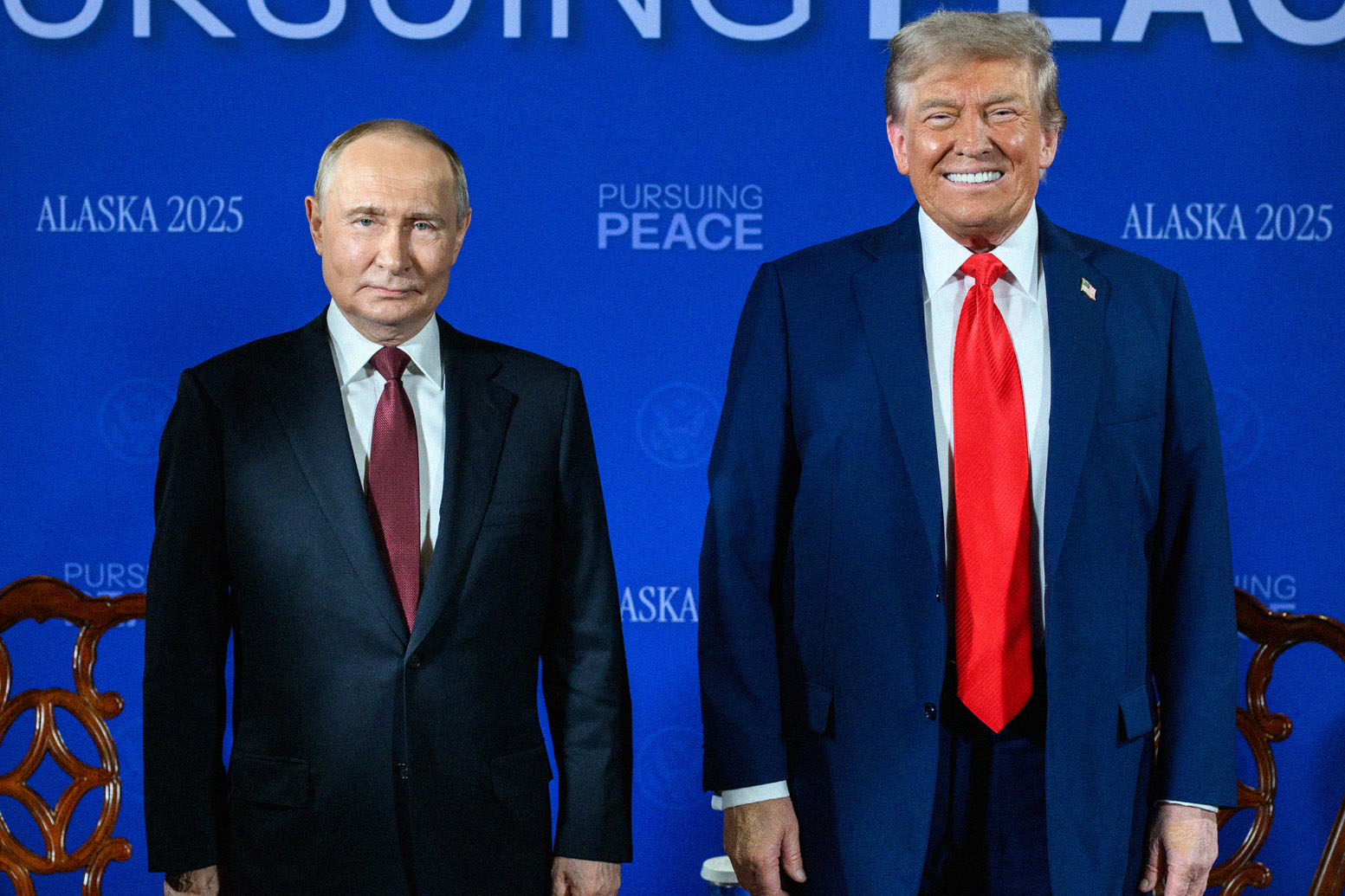
It is not diplomacy that dictates to the military sphere, but on the contrary, the military sphere that ultimately determines the real content and outcome of diplomacy.
The time has clearly come to enter into meaningful negotiations with the Russians, who, since they are obviously winning the war, will see no need to compromise on any of the main demands.
The fact is that, irrespective of any results (or lack of results) of the meeting in Alaska – or of any other such meeting – in the end, it is the battlefield that decides the result, not diplomacy.
Nevertheless, diplomacy can play a role, which will become increasingly important as the war reaches a major turning point. And the refusal of the Ukrainian leadership to enter into meaningful negotiations at the present time will mean that the war itself will determine the result of the war.
‘All or nothing’?
Somebody once said that there is no such thing as a bad peace or a good war. That is undoubtedly an oversimplification. However, in the present context, Trump is right when he says that it is better for Ukrainians to sacrifice territory in exchange for peace, rather than to lose everything by continuing an unwinnable war.
Even a blind man can see that a nation that has suffered defeat on the battlefield must accept terms dictated to them by the victors. That is self-evident, and has always been the case.
Most ordinary Ukrainians, if they are asked, would now reply that they want peace, even if there is a high price to pay. Anything is preferable to the present nightmare.
Yet, by a most peculiar logic (if that is indeed the right word for it), Volodymyr Zelensky refuses to accept the facts and demands that the Ukrainians must continue fighting to the bitter end.
He must understand better than anyone that this logic would inevitably lead to the complete defeat of his country, and in all probability, the disappearance of Ukraine as a separate nation state altogether.
His solution is quite simple. No compromise! Do not negotiate! Fight to the bitter end. Victory or death! The logic of all this is really quite simple: all or nothing!
And, as is all too often the case, the result will be nothing. For the Ukrainian people, that is, but not necessarily for Zelensky himself. His main concern at present is not to defend Ukraine. It is, at all costs, to preserve his control of Ukraine. He knows very well that the moment the war ends, he will fall from power. Elections must be held, and the result is a foregone conclusion.
No matter who wins the election, it will not be Zelensky. He is, in fact, deeply unpopular, and his popularity sinks further with every passing day and every defeat.
One of the reasons for his unpopularity is the growing suspicion that his regime is riddled with corruption. Huge sums of money that have been sent from abroad have disappeared without trace.
Much of it never reaches the frontline troops it was intended for. Instead, it enters the bank accounts of wealthy oligarchs and their political representatives and ends up in secret accounts in some foreign land, far from the fighting.
There it will stay, until one day it will be collected by certain political and military leaders who will flee the country in the face of an unstoppable Russian advance, to find a heroes welcome from their friends in the West and comfortable accommodation in some Caribbean island, where they can write their memoirs and create new and fictitious heroic legends about themselves. Meanwhile, the rest of the population will struggle to survive among the smoking ruins of their country.
What Zelensky demands
Meanwhile, in Kyiv, they continue to insist that no deal can be made without Ukraine. No more conversations between Trump and Putin! Zelensky must be present!
But Zelensky was not present. He was absent because he was not invited. Why was he not invited? Because the Trump team has understood that his only reason for being present was to place insurmountable obstacles in the way of peace.
Now he is in Washington, accompanied by all his European cronies. They will present their demands to Trump. And what precisely are these demands?
The Russians are winning. Never mind! They must immediately surrender and withdraw from all occupied territory – not merely Donbass, but also Crimea. These are Zelensky’s ‘peace’ terms! If matters were not so serious, this would be funny.
Everybody knows that this is the logic of the madhouse. It bears no relationship whatsoever to reality. It is delusional. Yet, strange to say, all the main leaders of Europe continue to support this madness 101 percent.
The policy of continuing the war until victory, when victory is completely out of the question, is presented as somehow defending the interests of the Ukrainian people. It is no such thing. It is a cynical betrayal of Ukraine.
The leaders of Europe are willing to fight to the last Ukrainian. They themselves, of course, will not be involved. From the sidelines, they encourage the Ukrainians to continue a fight against a vastly superior enemy, which they know perfectly well can only end in a catastrophe for Ukraine.
A man of principle
UK Prime Minister Keir Starmer is an expert in the art of facing in two different directions at one and the same time. One wonders how he does not get dizzy from these exhausting acrobatics.
Some unkind people have accused him of a lack of principle. That is grossly unfair. What is true is that he believes in flexibility in all things, especially the truth. And his motto is: okay, if you don’t like my principles, I will change them.
Moreover, there are some things in which he believes fervently. He is, for example, a convinced patriot. He is deeply committed to the nation he loves, and has sworn everlasting and unswerving allegiance to it.
Unfortunately, that nation is not the United Kingdom of Great Britain. It is Ukraine.
He has shown the most astonishing commitment to the cause of Volodymyr Zelensky and spends many hours speaking to him on the phone, which gives him little time to deal with the pressing problems faced by his own country, which is rapidly sinking into a sea of debt, neglect and poverty.
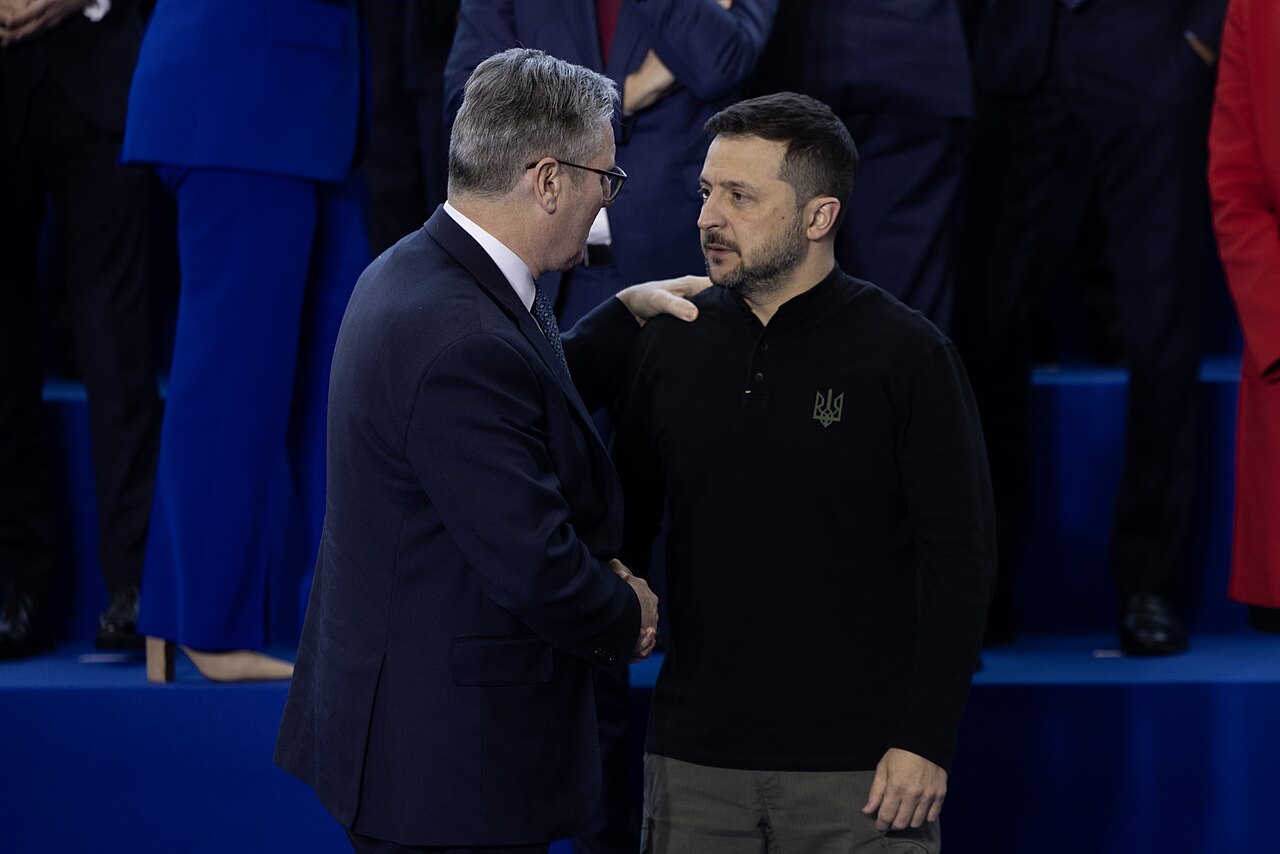
We always thought that Sir Keir did not possess any normal human emotions, nor did he seem to have many, if any, friends. But we were wrong. Whenever his bosom pal from Kyiv honours us with his presence, he rushes out and publicly embraces him before the television cameras on the steps of Number Ten Downing Street.
He was therefore presented with a problem when the Great White Chief from across the Atlantic failed to invite Mr Zelensky to his summit meeting in Alaska.
Now here was a dilemma. Visibly upset by this regrettable oversight, he was nonetheless afraid to offend the man in the White House, as this might upset what he calls the Special Relationship between Britain and the United States.
In his statement, he therefore took great pains to praise President Trump’s efforts, “which have brought us closer than ever before” to ending the war in Ukraine.
Nevertheless, he added that “the next steps must involve Zelensky – and that peace cannot be decided without him”.
The very idea of an American president sitting down to discuss peace terms with the Russians fills all these people with absolute panic. But what is the alternative to this? They have none at all.
All their proposals boil down to just one idea, which they repeat with an obsessive insistence: carry on with the same methods. Introduce new and crippling sanctions against Russia. Send more and more billions of dollars to the Ukrainians (they mean, to Volodymir Zelensky). Send more arms to Kyiv, in order to fight the war against Russia to the end.
The tedious chorus goes on endlessly repeating the same essentially meaningless formulas, as if by constant repetition, this nonsense would eventually be accepted.
Starmer says that he welcomes “the openness of the United States, alongside Europe, to provide robust security guarantees to Ukraine as part of any deal. This is important progress and will be crucial in deterring Putin from coming back for more.”
But that, “In the meantime, until he stops his barbaric assault, we will keep tightening the screws on his war machine with even more sanctions, which have already had a punishing impact on the Russian economy and its people.”
And he finally expresses:
“Our unwavering support for Ukraine will continue as long as it takes.”
That is easy to say. But people like Starmer never stop to think of what that really means. They conveniently overlook the fact that Russia has been battered with the most extreme sanctions for almost a decade.
They have forgotten that those sanctions were supposed to bring the Russian economy crashing down and compel Moscow to accept the dictates of NATO.
But these extravagant expectations were soon reduced to ashes. Far from ruining the Russian economy, it has not only survived all the sanctions that were thrown at it, but actually thrived, experiencing levels of economic growth far in excess of the miserable rates achieved by the West.
In fact, the sanctions have had a far more damaging effect on the economies of Europe and America than they have had on Russia. The loss of guaranteed supplies of cheap oil and gas from Russia have led to soaring rates of inflation (although this uncomfortable fact is never mentioned now).
But, hey! Forget all that. Just concentrate on repeating exactly the same failed strategy that led to nothing but disaster, destruction and loss of life in Ukraine and economic ruin in Europe.
Just carry on as before, with no real aim in sight, and hope that in the end, all will be well.
Whatever you might call this, it is certainly not a strategy worthy of the name. It recalls the philosophy of Charles Dickens’ well-known character Mr. Micawber’s famous saying: “I am confidently expecting something will turn up.”
Repeating the same behaviour or activity over and over again and expecting different results is a sign of insanity. But that is precisely what the Europeans are urging Donald Trump to do.
The alarm bells sound
They were therefore terrified of the alarming news that Zelensky had been summoned to meet the American president in Washington. All the alarm bells began to ring at full volume.
The memory of the celebrated encounter between their hero and Donald Trump in the Oval Office has haunted them like a nightmare ever since.
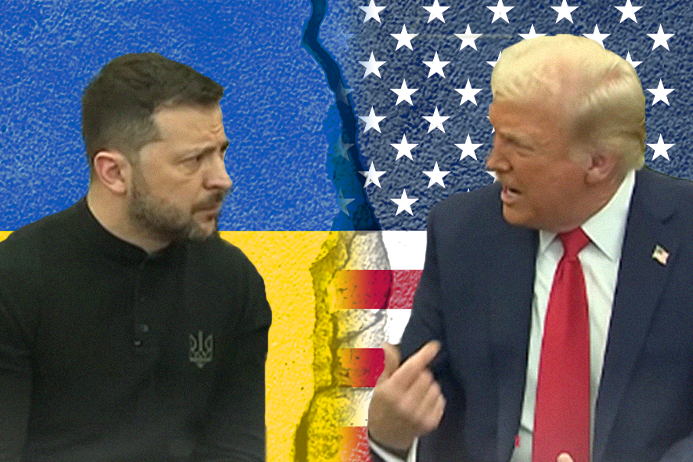
They at once feared the worst, since Zelensky’s grasp of the finer points of diplomacy is roughly approximate to the efforts of a Japanese sumo wrestler to perform in Tchaikovsky’s Swan Lake.
Horrific visions immediately danced before their eyes of an angry Trump once again making mincemeat of the unfortunate Ukrainian, who would once again be lost for words.
Such a disaster must be prevented at all costs!
They therefore immediately packed their bags and scrambled onto the first available plane to Washington – the whole pack of them, all clambering for any available seats on the flight!
German Chancellor Friedrich Merz, French President Emmanuel Macron, British Prime Minister Keir Starmer, Italian Prime Minister Giorgia Meloni, and, not to be left out in the cold, President of the European Comission Ursula von der Leyen and Nato Secretary General Mark Rutte – all were mobilised for this crucial operation!
They clearly intended to be present at the interview, so that poor little Volodymyr would not be alone, like Daniel in the lion’s den. They would be able to keep a careful eye on him, interrupting him whenever necessary to prevent him from putting his foot in it once more.
No doubt, their intention was to put heavy pressure on the president of the USA to accede to their demands – to forget everything that he said in the meeting at Anchorage, to break off all relations with Vladimir Putin and to revert to the previous policy of Biden.
That is, to introduce even more sanctions against Russia, to give all the military and financial aid that Kyiv demands, and to do this ‘as long as it takes’.
At this moment of writing, the aforementioned meeting has not yet taken place. From the limited information available to me, it seems that the meeting between Trump and Zelensky will not include the presence of the uninvited guests from Europe, although that remains to be seen.
Equally, it remains to be seen whether their tactic of ganging up to pressurise Trump will have the effect they anticipate – or the very opposite. Trump is not a man that likes to be pressured by anyone.
Moreover, it is an open secret that he despises Zelensky and has a very low opinion of the European leaders. By contrast, he seems very much at home in his conversations with Vladimir Putin. And for Trump, it seems that personal chemistry does matter.
Will they succeed in getting him to make concessions? Since Trump is known to be a highly unpredictable and volatile character, that cannot be excluded.
But the initial indications do not point in that direction. From the news reports, he has made it clear in advance that Ukraine must not be admitted to NATO membership and must forget all about Crimea. These are two points that will immediately put him on a collision course with Zelensky.
The problem is that this gentleman has received preferential treatment for so long (and this mistake has been repeated by the Europeans themselves) that he feels entitled to receive anything he asks for, immediately and without question. He is therefore organically incapable of making any concessions whatsoever.
The diplomatic offensive launched by the European leaders may therefore end like the Titanic – shipwrecked on a gigantic iceberg and sent to the bottom of the ocean.
Nevertheless, nobody can say in advance what the final outcome of this deadly game of poker will be.
The war party in the USA received a serious setback with the meeting in Alaska.
Trump’s surprise move seems to have caught even some of his US critics off balance. Even Lindsey Graham, Republican Senator of South Carolina, the author of a notorious plan for what he called “bone crushing sanctions” against Russia, and a leading hawk on the Ukraine war, said on Fox News Friday night:
“Let me tell you, I’ve never been more hopeful this war can end honorably and justly than I am right now”.
For the time being, at least, the pressure on Trump on the domestic front seems to have abated somewhat. How long that lasts is another matter entirely.
The plans of the warmongers have been upset. This fact is shown by the rage and hysteria of the Europeans.
What happens hereafter, we shall have to wait and see. But it is certain that, despite what he says, Senator Graham and his gang have not changed their views, and will resume their clamorous demands for sanctions against Russia as soon as the opportunity presents itself.
However, whatever happens, it will change little or nothing on the battlefield itself, which is the decisive question.
Neither the sanctions nor the vast quantities of American weapons have had the slightest effect in halting the Russian advance in Ukraine.
The only effect has been to prolong this ruinous and barbaric conflict for a few more months, with disastrous effects on Ukraine itself.
Such a level of cynical hypocrisy scarcely has any equal in the entire sordid annals of international diplomacy.
By deliberately prolonging the war, they are prepared to accept the death of many thousands of men, women and children, and the wholesale destruction of Ukrainian society.
I am tempted to write the words: shame on you! But these moral bankrupts do not know the meaning of the word shame. These miserable hypocrites can sign the death warrants of a whole nation without hesitation, and then retire for the night to sleep peacefully in their beds.
As usual, it is the poor people who will pay the price for it. The European working class will pay for these endless wars with a new wave of inflation, high energy prices, increased spending on arms, high taxes, lower living standards and deep cuts in health, education and social care.
But the highest price of all will be paid by the poor, unfortunate men, women and children of Ukraine. The bill will be presented to them in blood.
And those who bear full responsibility for this atrocity are the very leaders who falsely claim to be the ‘defenders of Ukraine’.
London, 18 August 2025

